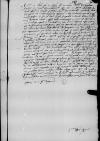Letter #2163
Ioannes DANTISCUS to Tiedemann GIESEHeilsberg (Lidzbark Warmiński), 1539-06-13
English register:
Dantiscus thinks that fearing how the [open] letter [of the Prussian councillors on changing the place and time of the Royal Prussian Diet] will be received at the court should not affect their actions. He also does not doubt that the King [Sigismund I Jagiellon] will make the right decision.
He is sending the reply from the Gdańsk Town Council. He asks Giese to remind them in a friendly way not to write (together with the other towns) too sharply [to the King].
Dantiscus agrees with Giese’s opinion as to the succession following the death of the Castellan of Elbing (Elbląg) [Ludwig von Mortangen (Mortęski)]. He asks him to share it with the other lords [councillors]. In Dantiscus’ view, it is worth raising the issue in the open letter [from the Prussian councillors to the King]. He will describe the matter more extensively in his own letter.
As regards Giese’s subject, Glasnotzki, Dantiscus is transferring to the addressee all the powers he himself previously held on the basis of Glasnotzki’s will.
Dantiscus recommends that Giese not take to heart the anger [of the King’s envoy to the Prussian Diet, Paweł Płotowski, caused by the assembly’s cancellation]. Replying to [Płotowski’s] question, he has informed him that the senators are still discussing it, but the Diet will not be held sooner than St. Michael’s Day [September 29].
| received 1539-06-14 Manuscript sources:
Auxiliary sources:
Prints:
| ||||||||
Text & apparatus & commentary Plain text Text & commentary Text & apparatus
Reverendissimo in Christo Patri et Domino, domino
Reverendissime in Christo Pater et Domine, frater et amice carissime et honoran(de) or honoran(dissime)⌈honoran(de)honoran(de) or honoran(dissime)⌉.
Salutem et fraternam commendationem.
Quod Dominatio Vestra Reverendissima cf.
Placet mihi Dominationis Vestrae Reverendissimae consilium de successore petendo domino
De subdito Dominationis Vestrae Reverendissimae
Ringat
Qui Dominationem Vestram Reverendissimam quam diutissime nobis incolumem et felicem conservabit. Quod reliquum est, me fraterno amori commendo.
Ex
Reverendissimae Dominationis Vestrae frater integerrimus


 BCz, 245, p. 190
BCz, 245, p. 190